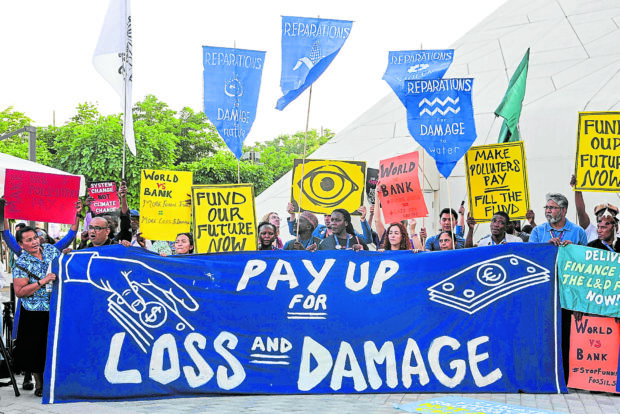Global warming accelerating at ‘unprecedented’ pace: study

Environmental activists gather outside the venue of the COP28 United Nations climate summit in Dubai on December 6, 2023. Almost 2,500 fossil fuel lobbyists, a summit record, have been accredited for the talks as negotiators wrestle with calls to end all new oil, gas and coal projects to curb global warming. (AFP)
Carbon budget spent
Another factor contributing to the heat is the decline in certain polluting particles in the atmosphere that reflect some of the Sun’s energy back into space, the study found. “The main reason is cleaning up of air pollution, first in Europe and the US (acid rain) and more recently in Asia, particularly China,” Glen Peters of Norway’s CICERO Center for International Climate Research told AFP. Tightening of global shipping regulations and the decline of coal-fired energy have also contributed to a drop in sulphur dioxide emissions, which also had a cooling effect. But by far the primary driver of global warming was “greenhouse gas emissions being at an all-time high”, the study said. Average annual emissions for the 2013-2022 period were 53 billion tonnes of carbon dioxide and the equivalent in other gases — primarily from the use of fossil fuels like oil and gas, the report said. In 2022, emissions amounted to 55 billion tonnes. It means that the world’s carbon budget — the estimated amount of greenhouse gases that can to be emitted before driving the planet over the 1.5C threshold — is “shrinking fast”, the study warned. In 2020, the IPCC calculated the remaining carbon budget in the range of 500 billion tonnes of CO2. By early 2024, the budget had decreased to around 200 billion tonnes, the study said. The report’s lead author Piers Forster said there is a “bit of optimism” at least in one finding. The rate at which emissions have grown in the most recent decade appears to have slowed since 2000, which he said signals “we’re not necessarily going to get a big, increasing acceleration of climate change”. However, co-author Pierre Friedlingstein, told a press briefing that the slowing is not enough to avoid climate change. “We don’t need emissions to be stable. We need emissions to go down to net zero,” Friedlingstein said. “As long as emissions continue at the same level, the warming will continue at the same level.” Without significant change in emissions, the 1.5C threshold would be breached and become a “long-term average” within the next decade, he added.
READ NEXT
EDITORS' PICK